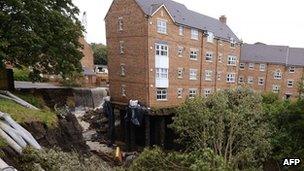UK floods: Disruption threat receding
- Published
Emergency services wade across to an elderly care home where residents have been stranded by flood waters
Floodwater is subsiding across much of the UK, following the most intense September storm in 30 years.
In England and Wales, there are now 27 flood warnings, external, indicating flooding is expected, and 34 flood alerts, meaning flooding is possible.
BBC forecasters have said the worst of the rain is now over.
Meanwhile, North Wales Police are conducting an investigation after the bodies of a young couple were discovered in a Wrexham river.
Alicia Williams and David Platt, who were both 25 and from Ruabon, were found near Felin Puleston, at the River Clywedog.
Ms Williams's body was found on Wednesday afternoon. Search teams then discovered the body of Mr Platt in the early hours of Thursday. Witnesses said they had been seen walking their dogs in the area on Wednesday.
Police said the deaths were not being treated as suspicious but the circumstances are still being investigated.
Heavy rainfall over the past three days has affected many areas of north Wales and a fire service spokeswoman described the River Clywedog as "fast flowing".
The Environment Agency (EA) said about 570 homes and businesses had been flooded across England and Wales since Sunday when the storm first swept in.
About 100 properties were flooded in Yorkshire alone, and 300 across Yorkshire and north-east England, the EA said.
Meanwhile, a block of flats in Newburn, Newcastle are likely to be demolished after floodwater gouged out the ground that forms part of the building's foundations.

Engineers said the flats in Newburn are likely to be demolished after the ground was eroded by floodwater
Residents of Spencer Court reacted angrily to the news at a public meeting on Thursday evening.
They earlier demanded that either the developers Dunelm Homes or the landowners Northumberland Estates took responsibility for the ground collapse. Neither company has accepted liability.
Engineers for Northumberland Estates told the meeting an inspection had been carried out and the report was expected to confirm the flats were beyond saving.
The number of flood warnings and alerts is starting to reduce, but homes, roads and the rail network continue to be affected by flooding in northern parts of England and Wales.
Towns and villages along the river Ouse in North Yorkshire are particularly at risk, with some homes already flooded.
In other developments:
The River Ouse at York, which flooded riverside car parks on Wednesday, reached its peak at 5.06m above normal level, which the Environment Agency says is its second highest ever recorded level
Yorkshire Water says river water is getting into its sewer network, causing it to overload. It says its pumping stations are working at full capacity to pump the waters up for treatment
The Army were drafted in to help bolster flood defences in the North Yorkshire village of Cawood. About 4,000 sandbags were heaved into place on Wednesday night to protect people's homes and businesses
An 11-year-old schoolboy, named by his head teacher as Joe Compton, who was struck by lightning in Swindon on Wednesday is in hospital, in a stable condition
The EA says about 300 homes have been flooded in the Yorkshire area
York is still "open for business" and the flood defences will be able to cope, the city's council says
BBC weather forecaster Laura Gilchrist said there would be no more of the persistent rain that caused problems in England and Wales. There would be light showers in some areas, but many places would have a dry day, she added.
The forecaster said flood warnings remained in place because of the potential for some of the rainfall from recent days to be flowing through river systems.
Meanwhile, road and rail networks in parts of the UK are still struggling to return to normal, with delays and disruptions continuing to affect northern England.
Councils have urged the government to set up an emergency fund to help pay for millions of pounds of repairs to roads damaged by the persistent rain and flooding in recent months.
The Local Government Association warned repairs would be needed to bridges, roads and pavements and the urgent nature of the repairs could stretch town hall budgets.
It has called on the government to set up an emergency capital highways maintenance fund, as it did following the floods which hit swathes of the country in summer 2007.
A Met Office spokesman said the storm was caused by a "kink" in the jet stream, a high-altitude band of wind which effects the course of weather systems.
He said the low pressure system that brought the rain became caught in the kink, and "ricocheted over the country" instead of heading north of the UK.
- Published5 October 2012
- Published27 September 2012
- Published28 September 2012
- Published27 September 2012
- Published27 September 2012